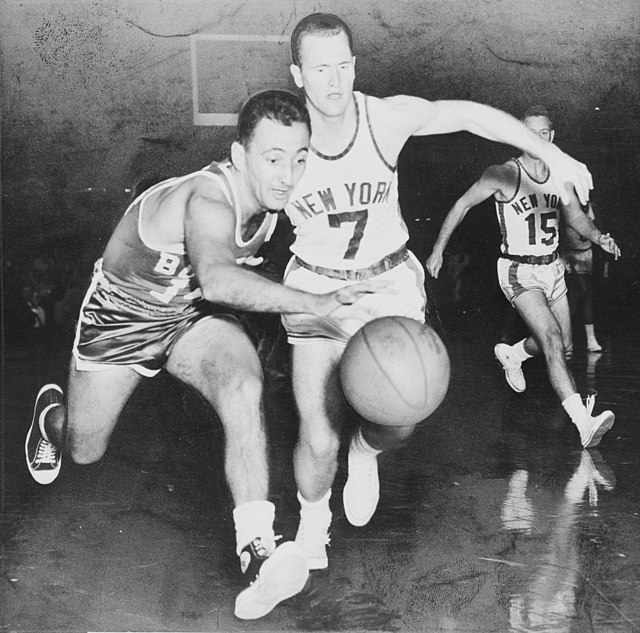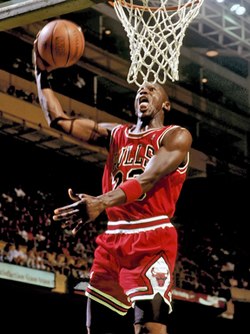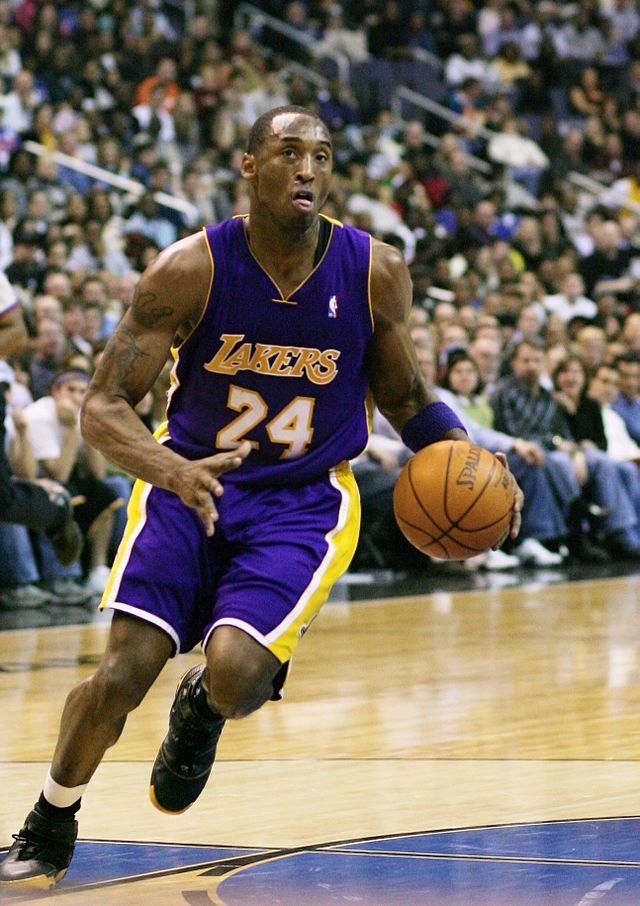Top Qs
Timeline
Chat
Perspective
All-NBA Team
National Basketball Association honor From Wikipedia, the free encyclopedia
Remove ads
The All-NBA Team is an annual National Basketball Association (NBA) honor bestowed on the best players in the league following every NBA season. The voting is conducted by a global panel of sportswriters and broadcasters.[a] The team has been selected in every season of the league's existence, dating back to its inaugural season in 1946.[3] The All-NBA Team originally had two teams, but since 1988 it is typically composed of three five-man lineups—a first, second, and third team.

From 1956 through 2023,[4] voters selected two guards, two forwards, and one center for each team.[1] This contrasts with the voting for starters of the NBA All-Star Game, which has chosen two backcourt and three frontcourt players since 2013.[5][6] The NBA's sister league, the Women's National Basketball Association (WNBA), announced late in its 2022 season that it was changing the composition of its All-WNBA Teams from the All-NBA format to a "positionless" format in which members are selected without regard to position.[7][8] Starting with the 2023–24 season, coinciding with the start of a new collective bargaining agreement (CBA) between the NBA and its players' union, the NBA adopted the WNBA's "positionless" format for All-NBA team composition—which the NBA had originally used before adopting a positional model in 1955–56.[9][10] NBA players receive five points for a first team vote, three points for a second team vote, and one point for a third team vote. Starting in 2023–24, the five highest point totals regardless of position make up the first team, with the second and third teams following. During the positional era, the players with the highest point totals at each position made the first team, with the next highest making the second team and so forth.[1] On one occasion, six players were placed on a team, when Bob Davies and Dolph Schayes tied for the first team in 1952; the second team remained at five.[3]
As part of effort to reduce load management for top stars in the league, the 2023–24 season introduced an eligibility threshold of 65 games played (out of the normal 82-game schedule) for most major regular-season playing awards and honors, including the All-NBA Team. To receive credit for a game for purposes of award eligibility, a player must have been credited with at least 20 minutes played. However, two "near misses", in which the player appeared for 15 to 19 minutes, can be included in the 65-game count. Protections also exist for players who suffer season-ending injuries, who are eligible with 62 credited games, and those affected by what the CBA calls "bad faith circumstances".[11][12]
During the era of position-based team composition, voters were instructed to "vote for the player at the position he plays regularly",[13] and some used the flexibility to designate a player at a position which was not their primary role.[13][14][15] A player who received votes at multiple positions was classified at the position in which they received the most votes.[1] This occasionally caused a player to be slotted to a lower team or miss an All-NBA selection altogether. For example, Draymond Green received votes at forward and center in 2016, but he was placed on the second team as a forward although he had more total points than the first-team center, DeAndre Jordan.[1][16] In 2020, Khris Middleton garnered votes at both forward and guard, yet he was not on the third team despite having more points overall than Ben Simmons and Russell Westbrook, who were selected at guard.[17][18]
LeBron James has the most All-NBA selections with twenty-one. Kareem Abdul-Jabbar, Kobe Bryant, and Tim Duncan previously shared the record with fifteen.[19] James also has the most All-NBA First Team honors with thirteen and is the only player to have done so as a member of three different teams,[19] while Bryant and Karl Malone are tied for second-most with eleven.[20] Malone and James each share a record eleven consecutive first-team selections.[21] Hakeem Olajuwon became the first international player to be named All-NBA in 1985–86.[22] Since 2019, at least two international players have been named each season to the All-NBA First Team,[23] including four players for the first time in 2023.[24][25]
Remove ads
Selections
Summarize
Perspective
| ^ | Denotes players who are still active in the NBA |
| * | Denotes players inducted to the Naismith Memorial Basketball Hall of Fame |
| † | Not yet eligible for Hall of Fame consideration[b] |
| § | 1st time eligible for Hall of Fame in 2026[26] |
| Player (#) | Denotes the number of times the player has been selected |
| Player (in bold text) |
Indicates the player who won the NBA Most Valuable Player in the same year[c] |
1946–47 to 1954–55


From the 1946–47 season to 1954–55 season, the All-NBA Team was composed of two teams, each with five roster spots, except when there were ties. During this period, players were selected without regard to position.
1955–56 to 1987–88







From the 1955–56 season to 1987–88 season, the All-NBA Team was composed of two teams, each with five roster spots, except when there were ties. During this time, players were selected with regard to position.
1988–89 to 2022–23
From the 1988–89 season through the 2022–23 season, the All-NBA Team was composed of three teams, each with five roster spots, except when there were ties. Players were selected with regard to position.
From 2023–24
Starting with the 2023–24 season, the All-NBA Team consists of three teams selected without regard to position, each with five roster spots, except when there are ties. Players will be listed in order of points received in voting; those tied on points will be listed in alphabetic order by family name.
Remove ads
Most selections
The following table only lists players with at least ten total selections.
| * | Denotes players inducted to the Naismith Memorial Basketball Hall of Fame |
| ^ | Denotes players who are still active in the NBA |
Remove ads
See also
Notes
- A player is not eligible for induction into the Naismith Memorial Basketball Hall of Fame until he has been fully retired for two calendar years.
- The Most Valuable Player award was first established in 1956.
- Dominique Wilkins, who was born in Paris, settled down in America, and has played for the USA Basketball National Team.
- Although Tim Duncan was born in the U.S. Virgin Islands and is a United States citizen,[30] the NBA considers him an international player.
- Tony Parker was born in Belgium. He holds French citizenship and plays for their national team.[35]
- Kyrie Irving, who was born in Australia, was raised in America, and has played for the USA Basketball National Team.
Remove ads
References
Wikiwand - on
Seamless Wikipedia browsing. On steroids.
Remove ads
